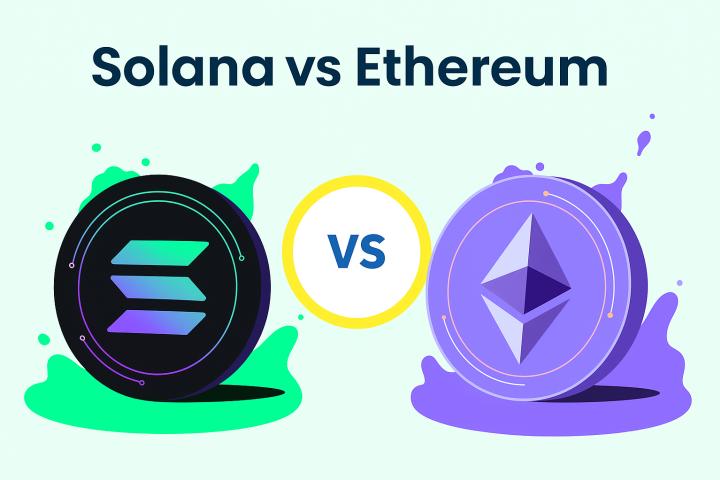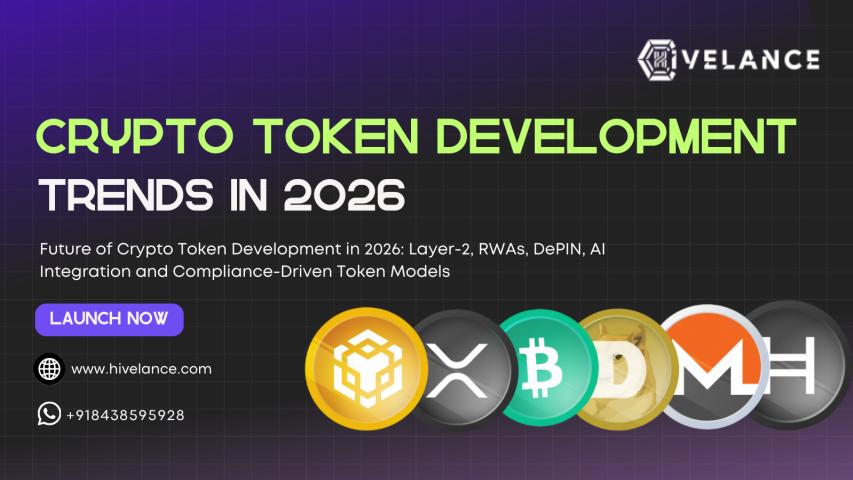Supply chain and logistics are critical sectors of the global economy. They ensure that goods move from manufacturers to consumers efficiently. However, these industries face many challenges, such as a lack of transparency, inefficiencies, and high costs. Enter crypto token development. It’s not just transforming the financial sector; it’s also revolutionizing supply chain and logistics.
This blog explores how crypto token development is reshaping these industries and why businesses are turning to this technology to enhance their operations.
The Basics: What Are Crypto Tokens?
Before diving into the impact on supply chain and logistics, let’s start with the basics. A crypto token is a digital asset that represents ownership or access rights to a particular asset or service. Tokens are built on blockchain technology, ensuring that they are secure, transparent, and easily transferable.
There are various types of tokens, such as utility tokens, security tokens, and asset-backed tokens. Each serves a different purpose. In supply chain and logistics, tokens can represent anything from a unit of goods to a payment for services rendered.
Enhancing Transparency and Trust
One of the most significant challenges in supply chain management is the lack of transparency. Traditional systems often rely on manual processes and disparate databases. This makes it difficult to track products from their origin to their final destination.
Crypto token development addresses this issue by creating a transparent and immutable record of each transaction on the blockchain. Every step of the supply chain can be tokenized. This means each transaction, from production to shipping to delivery, is recorded on the blockchain.
With tokenization, all parties involved in the supply chain, including manufacturers, suppliers, and customers, can access real-time data. This transparency builds trust among stakeholders, as they can verify the authenticity and condition of goods at each stage.
Reducing Costs and Increasing Efficiency
The traditional supply chain involves many intermediaries, such as banks, insurers, and customs brokers. Each intermediary adds costs and time to the process. Crypto tokens can streamline these processes by eliminating the need for middlemen.
For instance, smart contracts—self-executing contracts with the terms written into code—can automate and enforce agreements between parties. Payments can be automatically released when certain conditions are met, such as the delivery of goods. This reduces the need for manual oversight and speeds up transactions.
Additionally, tokenization can reduce administrative costs. With everything recorded on the blockchain, there’s no need for extensive paperwork or manual audits. This reduces the risk of errors and fraud, further driving efficiency.
Improving Traceability and Accountability
Traceability is crucial in industries like food and pharmaceuticals, where product safety is a top concern. Traditional systems often struggle with ensuring that products are sourced and handled correctly throughout the supply chain.
Crypto token development enhances traceability by allowing every product to be tracked from its origin to its final destination. Each product can be assigned a unique token, which is updated at every stage of the supply chain. This creates an unalterable record of the product’s journey, ensuring that it has been handled according to regulations.
If a problem arises, such as a product recall, the source of the issue can be identified quickly. This not only improves safety but also helps companies avoid costly legal and regulatory penalties.
Enabling Faster and More Secure Payments
Payment delays are a common issue in the supply chain. These delays can occur due to slow processing times, currency conversion issues, or disputes between parties. Crypto tokens offer a solution by enabling faster, more secure payments.
With crypto tokens, payments can be made instantly, regardless of geographical location. There’s no need to wait for bank processing times or deal with currency conversion fees. This speeds up the entire supply chain and ensures that suppliers and manufacturers are paid promptly.
Furthermore, using blockchain for payments adds an extra layer of security. Transactions are encrypted and recorded on the blockchain, making them tamper-proof. This reduces the risk of fraud and ensures that payments are accurate and timely.
Facilitating International Trade
International trade involves navigating complex regulations, currency exchanges, and shipping logistics. These challenges can slow down the process and increase costs. Crypto tokens can simplify international trade by providing a universal currency and automating compliance processes.
By using tokens as a medium of exchange, businesses can avoid the complexities of currency conversion. This is particularly beneficial for companies that operate in multiple countries. They can also use tokens to automate customs and regulatory compliance. Smart contracts can ensure that all necessary documentation is in place before goods are shipped.
This not only reduces the time and cost of international transactions but also ensures that companies stay compliant with local laws and regulations.
Enhancing Security and Reducing Fraud
Supply chain and logistics are vulnerable to various types of fraud, including counterfeit products, identity theft, and payment fraud. Traditional systems often rely on paper documents and centralized databases, which can be easily manipulated.
Crypto token development enhances security by using blockchain technology, which is decentralized and immutable. This means that once a transaction is recorded, it cannot be altered or deleted. This makes it extremely difficult for fraudsters to manipulate data.
Moreover, tokens can be used to verify the authenticity of products. For example, in the luxury goods industry, each item can be assigned a unique token that verifies its origin and authenticity. This prevents counterfeit goods from entering the supply chain and protects both consumers and brands.
Real-World Applications and Success Stories
Many companies are already leveraging crypto token development to enhance their supply chain and logistics operations. For example, in the food industry, some companies are using blockchain to track the journey of food products from farm to table. This ensures that the food is sourced ethically and is safe for consumption.
In the automotive industry, tokens are being used to track the manufacturing and shipping of car parts. This ensures that each part is authentic and meets safety standards.
These real-world applications demonstrate the potential of crypto token development to transform supply chains across various industries.
The Role of a Crypto Token Development Company
Given the complexity of blockchain technology, many businesses are turning to a crypto token development company to help implement these solutions. These companies specialize in developing customized tokens and blockchain solutions tailored to the specific needs of supply chain and logistics operations.
A crypto token development company can assist with everything from designing the tokenomics to implementing smart contracts and integrating the token into existing systems. By working with experts, businesses can ensure that their tokenized supply chain is secure, efficient, and scalable.
Future Outlook: What’s Next for Crypto Token Development in Supply Chain?
The future of supply chain and logistics looks promising with the continued development of crypto tokens. As more businesses adopt blockchain technology, we can expect to see further innovations that enhance transparency, efficiency, and security.
One potential development is the use of AI and machine learning in conjunction with blockchain. This could enable predictive analytics, allowing companies to optimize their supply chains in real time. Additionally, as regulations around blockchain and crypto tokens become clearer, more industries will likely adopt these technologies.
Conclusion
Crypto token development is shaping the future of supply chain and logistics in profound ways. From enhancing transparency and trust to reducing costs and improving traceability, the benefits are clear. Businesses that embrace this technology stand to gain a competitive edge in an increasingly global and complex market.
By working with a crypto token development company, businesses can navigate the challenges of implementing blockchain solutions and unlock the full potential of tokenized supply chains. As the technology continues to evolve, the impact on supply chain and logistics will only grow, leading to a more efficient, secure, and transparent global economy.


















